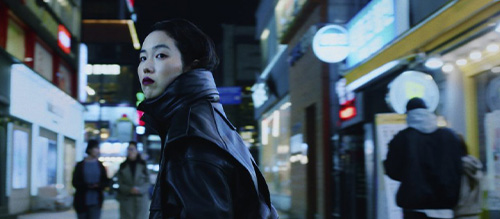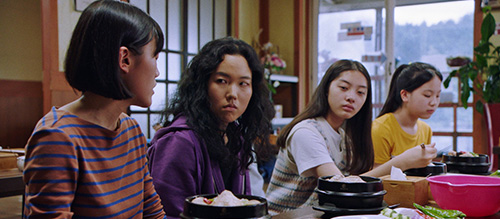Return to Seoul (2022) Review
Return to Seoul (2022)
Director: Davy Chou
Screenwriter: Davy Chou
Starring: Ji-Min Park, Oh Kwang-rok, Guka Han, Kim Sun-young, Yoann Zimmer, Louis-Do de Lencquesaing, Hur Ouk-Sook
When Davy Chou joined his close friend and her biological family for a meal during a visit to South Korea, the French-Cambodian director was struck by the complete lack of understanding between the two parties. Following the conclusion of the Korean War, it is thought that almost 200,000 children were orphaned or abandoned by their parents, and a large proportion of these children were subsequently adopted by families overseas. Chou’s friend was just one of these cases, and in recent years more and more of these children have sought to reconnect with their parents.
Chou was stunned by ‘these two worlds facing each other and trying but failing to communicate, not only because of the linguistic barrier, but because time had passed, their cultures were different, their feelings and emotions were too intense and complicated. There was a lot of frustration, a huge amount of emotion and I thought, if I got the chance, I’d like to make a movie about it.’
And so, he did – for three years, Chou developed a script based loosely around the thoughts, emotions, and feelings that he had encountered during this meeting, while also drawing on his own experience of biculturalism to delve into the difficulties of balancing dual familial and cultural roots. Set over eight years and split into three acts (with an epilogue to boot), Return to Seoul offers a deep-diving character study which traces the journey of a young French-Korean woman called Freddie (Park Ji-min) as she looks to reconnect with the country of her birth on a chance trip to South Korea.
Freddie has a survival instinct at her core – she’s feisty and tempestuous, a wily yet facetious character who is constantly fighting to prove herself to those she meets. She’s so concentrated on the present moment that she never allows herself to plan ahead, often putting her desires first and distancing herself from close relationships. ‘You do realise that I could erase you from my life at the drop of a hat?’, she offhandedly tells her boyfriend during a taxi journey, reminding him (and herself) that she is not ruled by her emotions, certainly not enough to allow anyone close enough to hurt her.
For Chou, it was important to select an actor who could feed their own experiences and personality into the role of Freddie. Park Ji-min, a first-time actor in Return to Seoul, was recommended to Chou by a friend – she had arrived in France, aged 8, from South Korea, shaped by the same cultures as Freddie. Chou and Ji-min deconstructed the script together, and Ji-min’s influence on the character’s relationship with femininity, plus the interactions with the men in her life, are driven by Ji-min’s own experiences.
Her sharp performance offers a stark contrast to many of the clichés that often shape female Asian characters in cinema; many of whom, according to Chou, are too often depicted as fragile, with too much focus on the ‘inner self’. It’s no wonder, then, that Freddie is a character who regularly defies customs and traditions, often to the shock and awe of those around her. In one captivating scene, Freddie grows tired of the dry conversation during a meal with her new friend Tena (Guka Han), and instead decides to shake up the atmosphere in the restaurant that she’s eating in, bringing together all of the diners to talk, drink, laugh and revel in one another’s company, deconstructing cultural norms in the process.
During this exchange, Freddie is complimented on her ‘ancestral Korean’ features. After experiencing immediate feelings of disconnection and alienation in her homeland, she is somewhat taken aback by the admiration of her acquaintances at these ancient Korean qualities which are so deeply embedded into her DNA. In her mind, she is still an outsider in the land which bore her, which directly correlates to her need to challenge those around her, to shake up situations and keep people on their toes, almost as a defence mechanism to hide this lack of connection.
Despite an initial reluctance to trace her family, Freddie eventually visits the adoption agency on the advice of Tena in an attempt to locate her parents, with just a picture of herself as an infant and social security number in hand. While her mother proves evasive, she soon receives contact from her father (Oh Kwang-Rok), who invites her to stay with him and his new family. The immediate awkwardness between Freddie and her father’s family is intense, harking back to Chou’s experience with his friend and her parents. Within a matter of minutes, they are discussing relocation, marriage, clothing and her appearance, leaving Freddie uncomfortable and irritated.

The language barrier further isolates Freddie, especially as many of her snide comments and biting retorts are censored by Tena. Her father, largely silent and brooding, is too ashamed and embarrassed after years of guilt to look her in the eye. After one-too-many drinks, he completely oversteps his boundaries in a bid to make up for her desertion, and when Freddie takes a step back and ignores his overtures to make amends, he hounds her with inebriated phone calls and drunken voicemails, extinguishing any sort of meaningful relationship with his daughter.
As the film moves into its second and third acts, Chou turns his to attention to Freddie’s reintegration into the megapolis of the Korean capital, two years on from her return. The pastel-infused colour palette is replaced by the neon radiance which illuminates the sleazy underbelly of Seoul, and it is at this point that the narrative becomes disjointed, losing some of the momentum that had steadily been built over the first hour of the film. Freddie’s journey of familial reconnection begins to play second fiddle to her newfound life in Seoul, and the shift in tone and atmosphere signifies that Freddie is now a part of this world, a staple of the Seoul underground, still haunted by her past but now a piece of the furniture in a city that she originally felt so alien to. Rocking her slick, greased-back hair and ruby-red lipstick, she becomes ever more enveloped into a world which continues to call her back, year after year, until it becomes too much for her to handle.
Return to Seoul is a tale about that which is lost when a person is taken from their country of birth, and the connections that are difficult to reforge when they are eventually able to return. Thomas Favel’s beautiful camerawork captures the many sides of Seoul, and it’s easy to get lost with Freddie in a city which is as alive in the deep of night as it is during the daytime. The rhythm of Return to Seoul suffers slightly as it shifts between acts, each feeling slightly fragmented and standalone in nature, but a plethora of transfixing performances – not least by the newcomer, Park Ji-min – keeps the story ticking over enough to feel absorbed throughout Freddie’s journey. She embodies the very essence of someone trying to find their place in the world, not knowing where she’s heading but always aware of the circumstances that have led her to where she is. Freddie has been shaped by her relationship with her homeland – she’s a lone wolf who, in the end, has had to rely on her own instincts for survival.
Score: 16/24
Written by Jake Gill
You can support Jake Gill in the following place:
Twitter – @Jake95Gill


